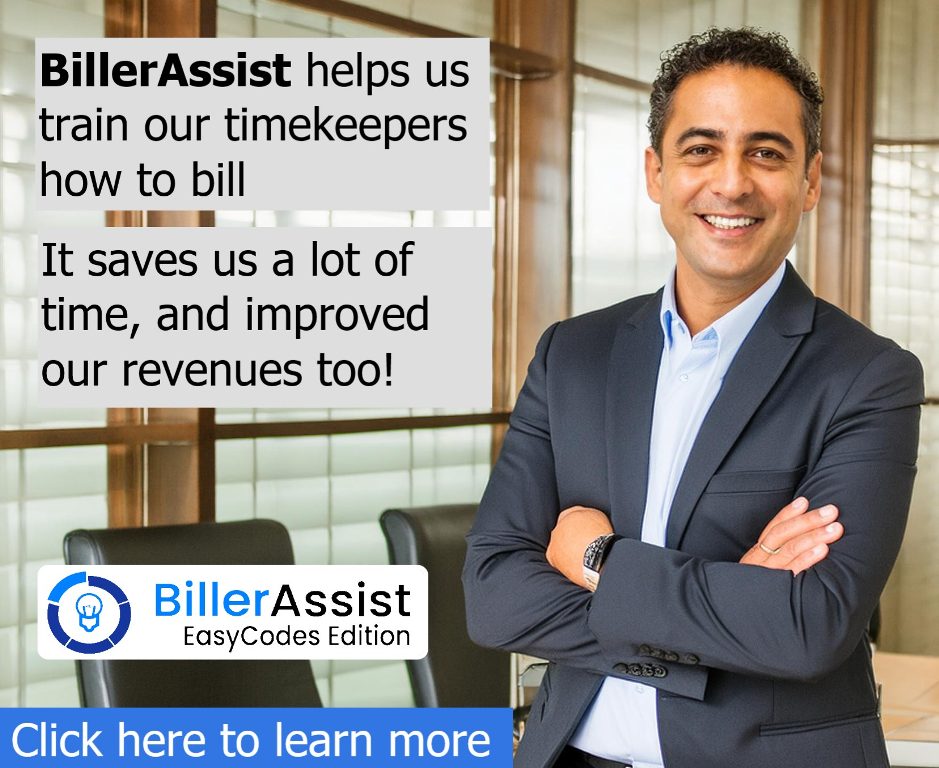Why Using AI for Legal Billing is “Actually Intelligent”
Artificial Intelligence (AI) has revolutionized how we approach tasks and solve issues, permeating numerous areas of society from manufacturing to worldwide e-commerce, in-store shopping to medicine.
AI has long been used in the legal industry to improve productivity in the discovery process, but new applications also apply AI for legal to billing, legal research, and even predictive analysis.
Many articles address how AI might increase productivity in law firms, particularly in light of the rise of “generative AI" applications for legal research and drafting.
The focus of this article is on the particular application of AI in the sphere of legal billing. Unknown to many, implementing AI for legal billing actually has a number of important advantages.
AI For Legal – Improvements in Productivity
AI has the potential to greatly boost a law firm's productivity in a number of ways.
For example, by using AI-powered legal technology that automates document analysis and management, lawyers can spend less time handling documents manually. AI applications can swiftly sort through massive amounts of legal papers to find pertinent statutes, case law, and other legal authorities.
This expedites the research process and frees up lawyers to work on more difficult tasks.
Furthermore, AI for legal tools like natural language processing make it possible to extract crucial information from unstructured data, which speeds up and improves the accuracy of compliance checks and due diligence.
Predictive analytics, which uses AI to help law firms forecast legal outcomes based on past data, is very helpful for risk assessment and strategy planning.
The management and assessment of contracts is a key area in which artificial intelligence is used in law firms.
AI legal technologies can streamline the contract lifecycle and guarantee uniformity across legal documents by analyzing contracts in bulk, highlighting any problems, and suggesting modifications.
As mentioned, “generative AI" applications are anticipated to revolutionize legal research and drafting. In a similar vein, AI-powered chatbots and digital assistants can offer first-rate client support by responding to routine legal questions and freeing up attorneys' time to handle more complex issues.
With respect to litigation, AI for legal technology is capable of managing and analyzing enormous datasets in the legal field, revealing patterns and insights that human
reviewers could miss.
This capability is especially helpful in complicated instances with a large volume of data because AI can swiftly produce a thorough
analysis.
Moreover, as to legal billing, AI can automate tedious and time-consuming operations relating to time tracking and invoice review, saving administrative time by more than 80%. This enables attorneys to concentrate less on mundane billing tasks and more on important legal work.
AI enables more accurate and timely billing, lowers administrative costs, and enhances cash flow management by automating a number of manual timekeeping and invoicing operations.
AI can also improve communication between law firms and their clients by offering applications that make it easier to share and update billing information in real-time and to immediately address billing expectations, which helps to ensure a reduction in billing disputes.
Reductions in Errors
Legal billing is changing as a result of AI-powered solutions that solve the long-standing issues with accuracy and transparency.
With the help of AI for legal tech, billing errors can be greatly decreased, guaranteeing that all billable hours are precisely recorded and appropriately charged. In the end, this results in more accurate billing and fewer client billing disputes.
AI can also improve invoicing processes' accuracy by highlighting possible mistakes and discrepancies for closer examination. These techniques greatly minimize human error by utilizing sophisticated algorithms.
Additionally, AI may recognize billable activity that could otherwise go unnoticed, resulting in thorough billing.
In addition to streamlining the billing process, this proactive approach to accuracy promotes openness and trust between law firms and their clients.
Increases in Profits
There is more to using AI in legal bills than merely cutting down on errors. Enhancing the general financial well-being of law firms is another goal, as is making sure that income generation is as effective and lucrative as feasible.
In addition to increasing billing accuracy, the notable increase in billing efficiency enables law firms to streamline their processes. AI has the potential to significantly reduce administrative overhead expenses.
Furthermore, quicker and more accurate billing procedures can facilitate payments and enhance cash flow, which ultimately increase realization and collection rates and thereby also boost profits.
The ability of AI-powered billing apps to evaluate past data and forecast various elements of upcoming billing cycles is perhaps even more significant, as it enables legal businesses to maximize the efficiency of their work and associated billing.
Accurately estimating the cost and viability of legal work is made possible by AI algorithms' predictive analytics capability, which can increase productivity and profitability.
For example, AI can be used to identify trends in billing data that might point to inefficiencies or places where cost savings might be obtained, allowing businesses to modify their procedures appropriately.
Ease of Compliance
By detecting problems and promoting improved compliance, artificial intelligence (AI) can assist in ensuring that billing entries adhere to Outside Counsel Guidelines (OCGs) and other client-mandated requirements.
A number of AI-powered applications make it easier to follow billing requirements customized to each client, as well as ethical requirements for attorneys.
These cutting-edge solutions allow real-time billing entry analysis in relation to particular provisions in OCGs and other regulations using machine learning algorithms to spot disparities and non-compliant actions.
By using these AI-powered apps, law firms can reduce non-payments and billing disputes, while also increasing client confidence.
AI for legal technologies dramatically cut down on the time and effort needed for manual review by integrating AI into the pre-bill review process, thereby freeing up attorneys and other legal professionals to concentrate on more strategic activities.
Not only can AI legal tools help ensure compliance with OCGs, but they can also help keep client agreements and standards current by automatically updating billing systems when new guidelines are released. Because of their dynamic adaptability, law firms can stay compliant even as customer requirements change.
AI is also useful for ensuring that budgetary compliance is followed. AI systems can notify businesses when anticipated costs are about to reach or surpass the budget by establishing thresholds for different billing categories.
This enables law firms to make necessary adjustments before invoices are sent out. This degree of AI-powered supervision is essential to keeping good client relations and preventing billing disputes.
Additionally, AI-driven analytics offer insightful information about billing patterns, empowering law firms to better negotiate with clients by presenting data-driven proof of increased efficiencies.
Conclusion
In general, the process of legal billing can be transformed for the better by the use of AI, by becoming more accurate, efficient, and client-friendly.
Nevertheless, law firms must be mindful of the ethical issues and potential hazards associated with artificial intelligence (AI), including algorithmic prejudice and data privacy concerns, despite the technology's many advantages. Legal practitioners must be aware of the benefits and drawbacks of artificial intelligence (AI) tools in order to utilize them responsibly and in a way that complements human competence.
By automating mundane and repetitive work, boosting decision-making, speeding up and augmenting legal research, and streamlining administrative processes, artificial intelligence (AI) can help law firms become more efficient. AI technology will play a significant role in the legal industry as it develops, providing creative answers to problems that law firms have historically encountered.





